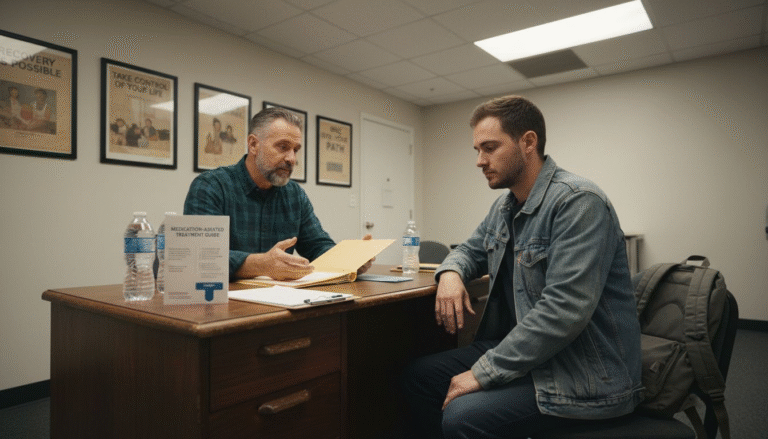Fentanyl addiction is a rapidly growing crisis, with countless individuals and families affected every year. This potent synthetic opioid, often prescribed for severe pain, has led to devastating outcomes due to its high potential for misuse and overdose. Recognizing the early signs of addiction can make a critical difference in helping someone seek treatment before the addiction deepens, potentially saving lives and preserving relationships. In this article, we’ll provide comprehensive insights into the signs of fentanyl addiction, the severe risks associated with its use, and the various ways Glendora Recovery Center offers compassionate and practical support for those ready to take the first steps toward recovery.
Understanding Fentanyl and Its Risks
Fentanyl is a potent synthetic opioid often prescribed for severe pain management. It’s about 50 to 100 times more powerful than morphine, which makes it effective in medical use but also extremely dangerous when misused. Unfortunately, fentanyl’s strength also makes it highly addictive. Knowing the risks and signs associated with fentanyl misuse can help you identify addiction sooner and seek appropriate intervention.
Common Signs of Fentanyl Addiction
Identifying fentanyl addiction early is crucial for intervening before severe physical and psychological effects occur. Here are some of the most common signs of fentanyl addiction:
1. Physical Symptoms
Fentanyl affects the central nervous system and alters how the brain perceives pain and pleasure. Physical signs of fentanyl addiction can include:
- Drowsiness or Sedation: Fentanyl often induces heavy drowsiness, even to the point of “nodding off.”
- Respiratory Problems: Slowed or shallow breathing is a significant side effect, as fentanyl suppresses respiratory function.
- Nausea and Vomiting: Frequent gastrointestinal symptoms are expected as the body reacts to the drug.
- Muscle Stiffness: Fentanyl can cause rigid muscles and a feeling of heaviness, particularly in the limbs.
- Constricted Pupils: Like many opioids, fentanyl causes pinpoint pupils that don’t dilate well, even in dim light.
2. Behavioral Changes
Behavioral shifts are some of the most telling signs of fentanyl addiction. Someone struggling with addiction may show:
- Isolation from Family and Friends: Many people with addiction withdraw from loved ones to avoid questions or concerns.
- Neglecting Responsibilities: Addicted individuals may neglect school, work, or personal responsibilities.
- Engaging in Risky Behaviors: Risk-taking, such as driving under the influence or spending time in unsafe areas, may increase.
- Doctor Shopping: People addicted to fentanyl may seek multiple prescriptions from different doctors to maintain their supply.
3. Psychological Indicators
The psychological impact of fentanyl addiction can be devastating, impacting emotional well-being and mental health. Psychological signs of fentanyl addiction can include:
- Intense Cravings: A person addicted to fentanyl may experience powerful urges to use the drug.
- Mood Swings: Fentanyl can create extreme highs and lows, leading to unpredictable mood changes.
- Anxiety and Depression: The cycle of addiction often heightens anxiety and depression, mainly as withdrawal symptoms appear.
- Loss of Interest: Things the person once enjoyed may become irrelevant or unappealing as fentanyl takes precedence.
The Importance of Early Intervention
Catching fentanyl addiction in its early stages is vital to achieving a successful recovery. The deeper an addiction becomes, the harder it is to overcome without professional support. At Glendora Recovery Center, we emphasize the importance of early intervention and encourage families and individuals to reach out as soon as they notice signs of addiction. Early intervention can prevent:
- Severe Health Consequences: Continuous fentanyl use can lead to irreversible physical and mental health issues.
- Legal and Financial Problems: Addiction often causes financial strain and can lead to legal troubles, especially when individuals begin obtaining fentanyl through illegal means.
- Strained Relationships: Addiction affects entire families, leading to conflicts, mistrust, and emotional distance that can be challenging to heal.
Recognizing an Overdose
Because fentanyl is so potent, overdose signs can develop quickly, sometimes within minutes. Knowing the signs can help you act quickly:
- Extreme Drowsiness or Loss of Consciousness: Inability to wake the person up.
- Slow or Absent Breathing: Labored, shallow, or stopped breathing.
- Bluish Skin or Lips: A lack of oxygen leads to discoloration.
- Weak or No Pulse: Reduced heart rate or absent pulse.
If you witness any of these symptoms, seek emergency assistance immediately. Administering naloxone can temporarily reverse the effects, giving you time to get medical help.
Steps to Take if You Suspect Fentanyl Addiction
If you suspect that a loved one may be struggling with fentanyl addiction, here are some steps you can take:
- Research Treatment Options: Knowing where to find help, such as Glendora Recovery Center, is essential.
- Open Communication: Approach the topic with empathy and avoid judgment to encourage openness.
- Encourage Professional Help: Guide them toward seeking help from professionals specializing in fentanyl addiction recovery.
- Offer Support, Not Enablement: Emotional support is crucial, but avoid actions that could enable the addiction.
- Consider an Intervention: If other methods have not been successful, a formal intervention may be helpful.

Treatment Options for Fentanyl Addiction at Glendora Recovery Center
Glendora Recovery Center offers a range of programs to help those struggling with fentanyl addiction. Our compassionate team specializes in personalized treatment plans that address each client’s unique needs.
1. Medical Detox
Because fentanyl withdrawal can be severe, medical detox is often necessary. At Glendora Recovery Center, we provide 24/7 medical support to manage withdrawal symptoms safely.
2. Residential Treatment
Our residential treatment program offers a structured, supportive environment free from external triggers. Clients receive individualized care, counseling, and therapy to support long-term recovery.
3. Intensive Outpatient Program (IOP)
For those who need a more flexible option, our Intensive Outpatient Program (IOP) allows clients to receive treatment while balancing other life responsibilities.
4. Dual Diagnosis Treatment
Many individuals battling addiction also face underlying mental health issues. Our dual-diagnosis treatment program addresses both addiction and mental health disorders concurrently, promoting comprehensive healing.
5. Holistic and Wellness Therapies
At Glendora Recovery Center, we recognize that healing is about more than just stopping drug use. We offer a range of holistic therapies—including yoga, meditation, and nutritional counseling—to help individuals reconnect with themselves physically, emotionally, and spiritually. These therapies work in tandem with evidence-based treatments, providing a comprehensive approach to recovery.
6. Aftercare Planning and Support
At Glendora Recovery Center, recovery doesn’t end when treatment concludes. Our aftercare services provide ongoing support, resources, and accountability to help clients maintain a life free from fentanyl.
The Role of Family and Community Support
Fentanyl addiction can be an isolating experience, but family and community support play an instrumental role in recovery. Glendora Recovery Center offers family therapy sessions to help families rebuild trust and strengthen relationships. Our community support groups provide a safe space where individuals and families can share their experiences, receive encouragement, and feel less alone in their journey.
How Glendora Recovery Center Stands Out in Fentanyl Addiction Treatment
At Glendora Recovery Center, we believe in more than just treating addiction—we focus on restoring lives, families, and communities. Here’s what makes us unique:
- Individualized Care: No two journeys are the same. We customize treatment plans to meet the specific needs of each client.
- Experienced, Compassionate Staff: Our team comprises professionals dedicated to helping clients achieve lasting recovery.
- Holistic Approach: Beyond traditional therapies, we incorporate holistic elements, such as mindfulness and wellness practices, to enhance recovery.
- Supportive Community: At Glendora Recovery Center, clients find a welcoming community that promotes connection and healing.
Frequently Asked Questions (FAQs)
What Are the Withdrawal Symptoms of Fentanyl?
Common withdrawal symptoms include anxiety, nausea, insomnia, muscle pain, and intense cravings. Glendora Recovery Center’s medical detox helps manage these symptoms safely.
How Can I Help a Loved One Struggling with Fentanyl Addiction?
Start by educating yourself, having an open, non-judgmental conversation, and encouraging them to seek professional help. Glendora Recovery Center offers various family support services as well.
Is Fentanyl Addiction Treatable?
Yes, fentanyl addiction is treatable, but it often requires comprehensive, professional care. Glendora Recovery Center provides a full continuum of care for sustainable recovery.
Take the First Step Toward Recovery with Glendora Recovery Center
If you or a loved one is struggling with fentanyl addiction, know that help is available. Glendora Recovery Center supports you with compassionate, effective treatment to promote lasting recovery. Don’t wait for addiction to take more away—reach out to us today to learn more about our programs and take the first step toward a healthier, brighter future.



